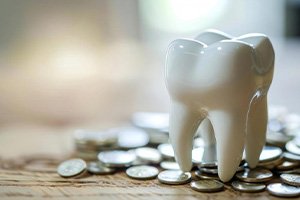Dental Crowns – Rockville, MD
Restoring Function and Beauty to Your Smile

Despite our best efforts to keep our teeth healthy and strong, common problems like decay, injury, and periodontal disease can rob our smiles of their beauty and functionality. In some cases, a tooth may be so badly damaged that a traditional filling simply isn’t enough to repair it. When a tooth is cracked, decayed, or otherwise compromised, a dental crown may be used to preserve and protect it from further damage. Dental crowns can restore form and function to damaged smiles, allowing our patients to eat, speak, and smile with confidence once again. Give us a call today to see if a dental crown in Rockville is right for you.
What Is a Dental Crown?

A dental crown is a customized restoration that is designed to look and feel like a natural tooth. Crafted from porcelain, metal, or a combination of the two, a crown serves as a cap that covers the entire visible surface of your existing tooth, providing it with structural stability and improved aesthetics. Dental crowns are most commonly used in the following circumstances:
- Replacement of a large filling from extensive decay
- Protecting and preserving a tooth that has been treated with root canal therapy
- To improve the appearance of a tooth that is misshapen, damaged, stained, or otherwise cosmetically flawed
- To complete a dental implant restoration
- To restore a tooth that has been badly fractured or broken
- To bolster the strength of a tooth that is at risk for chipping or cracking
- To attach a dental bridge
In order to promote a comfortable, seamless restoration, Dr. Sanker will meticulously match the color, shape, and size of your dental crown to match the rest of your smile. We will happily take the time to sit down with you to discuss your restorative options, including the materials used to fabricate your crowns, to ensure your ultimate comfort and satisfaction. Your oral health and your happiness are among our top priorities at Robert J. Sanker, DDS.
The Process of Getting a Dental Crown

In nearly all cases, it will take two appointments over the span of several weeks to get a dental crown. In order to place a crown, your natural tooth must be slightly modified in preparation. This will ensure that there is enough room for the dental crown to fit completely over the top of your tooth. Once a thin layer of enamel has been removed, we’ll take impressions of the area. This information will be sent to a local dental lab, where it will be used to fabricate your final restoration.
Creating a dental crown often takes several weeks. Before you leave your first appointment, we will place a temporary crown over the altered tooth to keep it comfortable and safe. When we receive your final restoration, you will return to our office to have the temporary crown removed. Then, your customized permanent dental crown will be bonded into place. We’ll check that you’re pleased with the results and that your bite feels comfortable, and then you’ll be ready to go out and show off your new smile.
Benefits of Getting a Dental Crown

- Prevents future damage or infection, as well as the expenses required to address them
- Restores the functionality of a tooth so you can use it without pain
- Improves the appearance of your tooth in a lifelike manner
- Preserves a tooth and protects it from extraction
- High-quality materials ensure a durable and long-lasting restoration you can count on
REPAIR AND RESTORE YOUR SMILE WITH DR. SANKER

If your smile has been damaged due to severe decay, disease, injury, or other factors, we invite you to contact our office to explore your restorative dentistry options with Dr. Sanker. We genuinely look forward to helping you achieve excellent oral health and a smile that looks as good as it feels. Conveniently located in Rockville, MD, our state-of-the-art dental practice warmly welcomes patients from throughout the nearby areas of Potomac, Bethesda, Wheaton-Glenmont, and beyond.
Understanding the Cost of Dental Crowns

While dental crowns are incredibly reliable at repairing and strengthening damaged or decayed teeth, the cost of the treatment is an important part of your decision-making process. Still, our team doesn’t want you to worry about the price when it comes to helping you regain a healthy and comfortable bite. During your consultation, we’ll discuss the contributing factors for the overall cost of your treatment as well as the financial options to help you work within your budget.
Factors That Affect the Cost of Dental Crowns

Several things will need to be considered when determining the price of your dental crown treatment:
- The complexity and/or extent of the damage as well as any necessary preliminary services, such as gum disease treatment or dental implant placement.
- The kind of material(s) used to create your dental crown may involve porcelain, metal, or porcelain-fused-to-metal—each of which has its unique price range.
- Whether your dental crown will be constructed through the traditional method or with another process, such as CEREC technology.
Our team will be sure to thoroughly discuss your treatment and walk you through the reasons why opting for quality over the least expensive methods is most beneficial for you. Options that come with lower prices might not provide the long-lasting results you’re expecting.
Does Dental Insurance Cover Dental Crowns?

Dental insurance typically helps pay for a portion of the cost of dental crowns because of their restorative properties. Of course, every policy will vary from patient to patient, so it’s important to double-check the details of your plan with your provider before moving forward with your treatment. Our team will also be happy to walk you through your benefits so that you know how to maximize your coverage. We can also file claims and help with the paperwork so that the process is smooth and stress-free.
Options for Making Dental Crowns Affordable

We understand that not every patient is currently covered by dental insurance. That’s okay! We’re proud to be partnered with a third-party financier known as CareCredit. This company has multiple plans that can help turn your dental treatments into monthly installments instead. These payments also typically come with little to no interest, meaning you can save more in the long run. Don’t hesitate to speak with our team so we can help you explore your financing options, that way you can focus more on restoring your teeth rather than the cost of service.
Dental Crowns FAQs
Are Dental Crowns Permanent?
Dental crowns are long-lasting but not permanent. With proper care, they typically last 10–15 years or more. Over time, wear, tear, or changes in your oral health will eventually cause a need for replacement. Their longevity depends on good oral hygiene and avoiding habits like grinding teeth or biting hard objects.
At Robert J. Sanker, DDS, we use high-quality materials to ensure your crown lasts as long as possible. To get the most out of your crowns, regular dental checkups are vital. These brief appointments at least twice a year will help keep your crowns looking, feeling, and functioning like they should for their lifetime.
Do Dental Crowns Get Cavities?
Crows themselves can’t get cavities because they’re made of non-living materials like porcelain or metal. However, the natural tooth underneath is still vulnerable to bacteria. Without a consistent and thorough oral care routine, decay can form at the edges of the crown, slowly spreading underneath.
Brushing with fluoride toothpaste, flossing, and regular dental cleanings at our Rockville office are the best ways to prevent cavities from forming! So, keep up with your oral hygiene routine and try to cut back on sugary or acidic foods to keep your smile safe.
Does It Hurt to Get a Dental Crown?
Getting a dental crown shouldn’t hurt, thanks to our use of modern techniques and anesthetics. During your procedure, Dr. Sanker ensures your comfort by numbing the area before shaping the tooth. Afterward, some mild sensitivity or soreness is normal but temporary.
Over-the-counter pain relievers or saltwater rinses can help ease any discomfort. If you experience persistent pain, contact us right away for an evaluation. Our goal is to make your experience—from consultation to recovery—as comfortable as possible.
What Happens If You Wait Too Long to Get a Dental Crown?
The main problem with delaying a needed dental crown is allowing any underlying issues to worsen. What starts as a small blemish or chip can become a crack, an infection, or deep decay. In severe cases, a crown may no longer be able to safely fix a damaged tooth, leading to extraction instead.
It's always best to get a crown as soon as it becomes necessary to protect your tooth and prevent more extensive, costly treatments. So, if you suspect a crown is needed, schedule an appointment with us soon to avoid complications. Don’t wait—the smile you have now is the only one you get!
